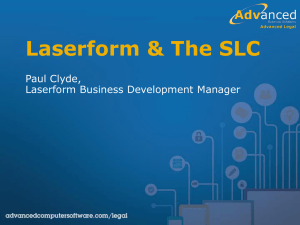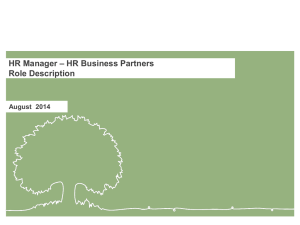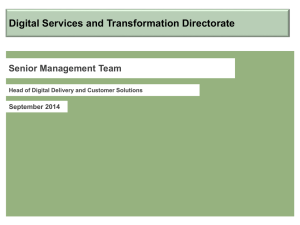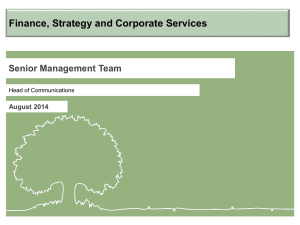People & Transformation Learning Plan
advertisement
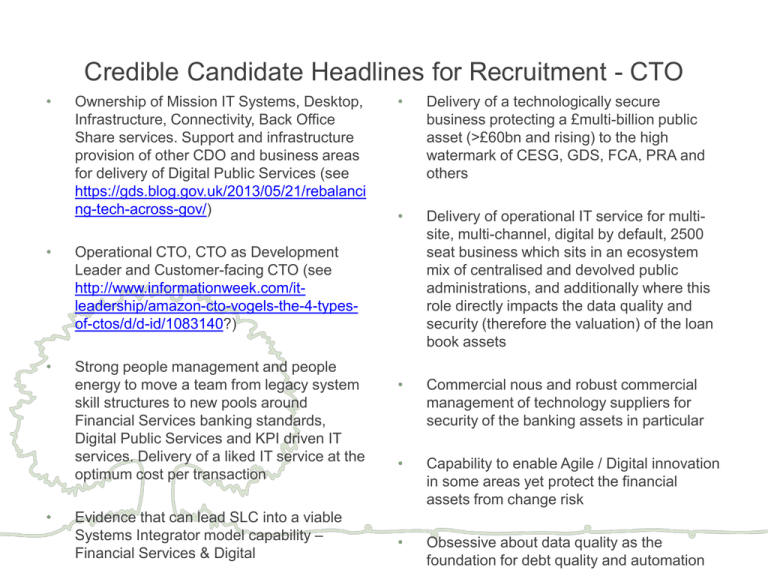
Credible Candidate Headlines for Recruitment - CTO • Ownership of Mission IT Systems, Desktop, Infrastructure, Connectivity, Back Office Share services. Support and infrastructure provision of other CDO and business areas for delivery of Digital Public Services (see https://gds.blog.gov.uk/2013/05/21/rebalanci ng-tech-across-gov/) • Operational CTO, CTO as Development Leader and Customer-facing CTO (see http://www.informationweek.com/itleadership/amazon-cto-vogels-the-4-typesof-ctos/d/d-id/1083140?) • Strong people management and people energy to move a team from legacy system skill structures to new pools around Financial Services banking standards, Digital Public Services and KPI driven IT services. Delivery of a liked IT service at the optimum cost per transaction • Evidence that can lead SLC into a viable Systems Integrator model capability – Financial Services & Digital • Delivery of a technologically secure business protecting a £multi-billion public asset (>£60bn and rising) to the high watermark of CESG, GDS, FCA, PRA and others • Delivery of operational IT service for multisite, multi-channel, digital by default, 2500 seat business which sits in an ecosystem mix of centralised and devolved public administrations, and additionally where this role directly impacts the data quality and security (therefore the valuation) of the loan book assets • Commercial nous and robust commercial management of technology suppliers for security of the banking assets in particular • Capability to enable Agile / Digital innovation in some areas yet protect the financial assets from change risk • Obsessive about data quality as the foundation for debt quality and automation Digital Directorate Senior Management Team ICT Chief Technology Officer August 2014 The Student Loans Company - 2014 Our Vision To be valued as a digital, customer-focused, centre of excellence Our Mission We enable our customers to invest in their futures by delivering secure, accurate and efficient assessment, payment and repayment services SLC needs to focus on essential organisational change to deliver an effective and efficient student finance service to its customers. This is a transformation during which it is vital that SLC remains stable and sustainable whilst we become a Digital, Customer Focused, Centre of Excellence. Alongside exemplary customer service and agile delivery, there is a longer-term strategy to deliver efficiencies and productivity gains throughout the organisation with a view to realising these benefits as soon as possible. To ensure that SLC can achieve its objectives in a more cohesive, customer-focused way we need to work more collaboratively by taking accountability and, where appropriate, sharing responsibilities, in order to make effective decisions that focus on our Vision, deliver our Mission and reflect our Values. To achieve this we need to work in less complicated structures with clearly understood boundaries. In order to fulfil the Mission, we are strengthening accountability and providing clarity for all roles and responsibilities, but especially those of leadership and management. We expect everyone working at SLC to be in a position to establish collaborative working throughout the Company ensuring a focus on quality and value in service delivery. To achieve our Vision we are designing new structures with the aim of increasing our customer focus with the right balance between frontline and back-office processes but also the flexibility to continuously improve and to innovate. As a Senior Management Team Member You will deliver value by: • • • • Deliver the Business Plan to achieve corporate goals and objectives; Sponsoring Business Transformation; Working collaboratively across SLC portfolios; Demonstrating “Leading the Way” behaviours and values. Company Leadership SMT Membership As a recognised leader in the Company you are anticipated to devote circa 30% of your time to the following activities: The SMT will propose potential courses of action to the ELT for delivering the Mission and, once decisions are made, SMT members will co-ordinate the execution of plans where: • Recommendations and decisions are made with cross-portfolio dependencies in mind, ensuring impacts, risks and conflicts are proactively addressed and resolved; • Actively promote and support transformation to achieve the Vision; • Show ownership of the Mission by guiding improvements to current operations and processes; • Put the customer at the heart of decision-making, resource allocation and delivery; • Take ownership of and deliver to the Company’s Medium Term Financial plans and drive efficiencies and cost savings underpinning the Transformation Programme • Empower, guide and enable staff to deliver the Mission; • Recognise and celebrate individual and team achievements; • Promote SLC values through your own actions; and • Exercise your accountability to shareholders and fulfil your responsibilities to relevant stakeholders, including colleagues and staff. • Authority for acting on decisions is part of your individual job role, however you will be jointly accountable with your SMT colleagues for achieving corporate objectives since these span SLC portfolios; In order for everyone at SLC to understand what is required of them, you and your SMT colleagues will hold joint responsibility for communicating the steps that are being taken to execute Company strategies; and You will also be responsible for reporting to the rest of SLC how well the company-wide processes are performing against agreed company-wide measures and what actions are being taken to keep SLC on track to deliver its Mission and achieve its Vision. Chief Technology Officer Responsible To: Chief Digital Officer Purpose of the role: Core mission systems delivery and the lynchpin of SLC as a Systems Integrator. Management Staff ICT Operations, Systems Integration, Service Delivery, Infrastructure, Misson / Core Banking Development 350 Budgetary Authority: Circa £30 million Salary range: £85K - £105K Providing strong leadership and senior level advocacy for the delivery of technology operations that support SLC s current and future business transformation programme. Ensure that the delivery of SLCs strategic direction and business priorities are fully supported by the right architectures, infrastructure, security and systems. Achieve value for money and quality results from suppliers within the context of long term service protection. Effective day to day management of the operational departments, maintaining systems , infrastructure, systems applications and developments along with the full suite of support services. Deliver IT services that meet the needs of SLC’s digital service users and operational staff Championing the strategic importance of people, talent management and development issues, building a strong culture of continuous learning and knowledge sharing, between specialists and generalists. Build a culture of data driven technology within the IT department, leading, engaging and supporting IT staff through the SLC change agenda Chief Technology Officer Key Responsibilities: •Set clear delineation and priorities, making sure that there is a strategic coherence between technology on cross-cutting issues such as user needs and security •Bring a deep knowledge of the technology landscape and market place to the department, and ensure it makes effective use of modern standards and solutions •Work with the Cabinet Office, BIS and other departments to exchange best practice •Enable and deliver change, oversee change and risk management and the interaction between product development, implementation and support service. •Build a culture of data driven delivery within SLC and ensuring the delivery and iteration of technology services is supported by effective analysis of the financial benefits of taking an open, user drive approach. •Baseline, develop and monitor IT’s technology-related budgets, costs , forecasts and related performance information. •Actively participating in cross-departmental process improvements, ensuring technology is strategically designed and implemented on a user focused basis. •Advocate and champion the need for technology and business transformation across SLC •Work with the CDO to develop, and then implement the Company’s ICT Strategy, for approval by the CEO/Board; •Develop and maintain a framework for effective supplier-partner management, to ensure target deliverables and cost parameters are met; •Provide advice and guidance to the Chief Digital Officer and Executive Team on the delivery of agreed development programmes and ICT systems and on up to date technologies; •Ensure that ICT services are delivered cost effectively and efficiently, both ethically and in accordance with compliance required and best practice standards, and that a disaster recovery approach is in place. •Recruit, develop, motivate and retain a competent and professional team in line with the Company’s HR procedures and commitment to Investors in People; •Delegate authority when appropriate to senior management, monitor and evaluate implementation of policies, strategies and business plans; •Review and maintain the ICT Strategy and, in conjunction with the direction of the Chief Digital Officer, amend the Strategy as appropriate; •Ensure that communications both to and from the Directorates and external suppliers are effective; •Promote and protect the reputation of SLC and its stakeholders by ensuring that IT services are provided to a high standard; •Review and evaluate present and future opportunities, threats and risks in the external environment and current and future strengths, weaknesses and risks relating to SLC; •Ensure that support arrangements are in place to protect the delivery of IT services in line with agreed statements on availability and performance of IT services •Manage a product development function supporting the annual programme of policy change and the Transformation Programme. Chief Technology Officer Key Outcomes: •Contribute effectively to the Company’s Executive Board team in respect of all management issues in the running of the business and to accept collective responsibility for such decisions; •Achievement of agreed corporate (Ministerial) targets; •Implementation of improved people performance •Implementation of IT service frameworks •Delivery of a secure infrastructure •Lead cost-effective and professional ICT teams delivering products supported by the Company; embedding a culture of value for money ensuring a maximisation of strategic outcomes within the resources available •Develop an ICT Strategy, which supports business needs, for CEO/Board approval; •Ensure that there is an effective organisation structure in place which enables delivery of Directorate objectives and champions the strategic importance of people, talent management and development issues, building a strong culture of continuous learning and knowledge sharing between specialists and generalists; •Prepare the SLC and the IT organisation for the target operation state delivered by the Transformation Programme; •Work closely with GDS to align SLC’s IT Strategy with Government’s digital agenda; •Work collaboratively with other Government exemplar organisations to identify shared expertise, that can assist with adoption of new technologies; •Working closely with BIS, CDO and partner organisations to identify opportunities for sharing investment and expertise; •Develop and maintain excellent relationships with all partners, contractors , key stakeholders and customers; and •Ensure that ICT strategy is aligned to the Company strategy and the Government ICT and digital strategy; Skills, Knowledge and Experience: •Credible Financial Services experience appropriate to the provision of banking solutions and protection of a growing loan book (>£60bn) •Credible Contact Centre, Document Processing track record in multi-site operations and 2500 FTE •Demonstrable and practical experience at a senior level, in public or private sector, of working with senior colleagues to deliver IT services and changes to business processes and systems, to deliver cost savings and service improvements for customers •Graduate in an IT-related discipline with MBA an advantage; •A seasoned ICT professional with a proven track record of continuing professional development with experience of leading a professional team defining and delivering a programme of improvements to internal processes, structures and capability •Proven track record of managing ICT services and the delivery of major complex development projects, with high technical specifications, within tight budgetary and timescale constraints; •Effective communication skills with an ability to inspire and encourage debate on strategic issues with all stakeholders; •Ability to demonstrate both a detailed knowledge of new technologies and an ongoing familiarity with the integration and implementation of existing systems with new technologies; Detailed knowledge of Financial Services industry security •The ability to also manage partner/provider relationships under PSI or PPP. •Digitally literate and capable of effectively engaging with technical staff, suppliers in order to define the optimum approach to service design •Understanding and experience of using agile project management techniques and working practices, open source, cloud platforms and digital services. •Strong influencing skills with both internal staff and external stakeholders with the ability to provide clear and non-technical advice/interpretation of complex information •Demonstrable experience of working with modern network management solutions (MPLS or similar) utility or commoditised hosting environments •Awareness and understanding of both Data Protection laws and regulations, plus Business Continuity principles BS25999 Chief Technology Officer – GDS Service Manual PURPOSE Deliver technologies and systems that meet the needs of the department’s digital service users and staff Provide strong leadership and senior-level advocacy for the delivery of technology solutions - both IT and digital - that support department’s current and future business transformation programmes. Define the strategic direction and business priorities for the development of the department’s technology, ensuring that digitally driven solutions and services are fully supported by the right architectures and systems, and that dependence on existing legacy systems and contracts is dramatically reduced. Give effective management to technology leads, setting clear delineation and priorities, and making sure that there is strategic coherence between technology and digital on cross-cutting issues such as user needs and security. Embed the delivery of a sustainable, high quality technology capability across the department, and a complementary commercial strategy to deliver business transformation. Bring a deep knowledge of the technology landscape and marketplace to the department, and ensure that it makes effective use of modern standards and solutions Work with the Cabinet Office, HM Treasury and other departments as the Department’s Technology Leader to exchange best practice, develop cross-government strategic direction and deploy commodity shared services within the department. RESPONSIBILITIES Delivering projects or programmes with a strong understanding of agile project management methodologies, change and risk management and the interaction between product development, implementation and support service Defining the problem, vision and solution for the business and cultural change required to drive technology transformation, and introducing new processes and procedures to ensure business and service improvements are achieved Prioritising and driving the successful delivery of programmes and projects within relevant time and costs constraints and to the appropriate level of quality Working with the Cabinet Office to shape the government’s strategic approach to mission IT, including security, procurement, governance, and capability building Assuring digital services comply with the ‘Digital by Default Service Standard’ ahead of being launched on?GOV.UK, and that IT projects are delivered in line with a?technology code of practice Building a culture of data-driven delivery within the department, and ensuring the delivery and iteration of technology services is support by effective analysis of the financial benefits of taking an agile, open, user-driven approach Baseline, develop and monitor department technology-related budgets, costs, forecasts and related performance information Actively participating in cross-departmental process improvements, ensuring technology is strategically designed and implemented on a departmental, user-focused basis rather than projecting an organisation's internal structures Driving forward changes to the provision of internal IT services across the department, including oversight of existing internal teams that manage these services on a day to day basis, and liaison with the centre on the implementation of shared commodity services Advocating and explaining the need for technology transformation to board-level senior officials, Ministers and external stakeholders OUTCOMES Be highly articulate and credible at the most senior level across and outside the civil service, consistently delivering inspiring, engaging and meaningful messages about the future direction; Champion the strategic importance of people, talent management and development issues, building a strong culture of continuous learning and knowledge sharing between specialists and generalists; Take a strategic perspective to identify the capability needs of the Department and identifying and nurturing future leaders through well defined succession planning; Embed a culture of value for money, working collaboratively across boundaries to ensure that the Department maximizes its strategic outcomes within the resourcing available; Build a performance culture that is orientated to tangible delivery outcomes and rewards those appropriately; Create a directorate that is viewed as an exemplar of high quality technology transformation across the civil service and beyond, making it an enviable environment to work in Shape, promote and exemplify desired departmental and civil service values and culture SKILLS Demonstrable and practical experience at a senior level, in public or private sector, of working with senior colleagues to deliver transformational change to business processes and systems, to deliver cost savings and service improvements for customers Experience of leading transformation programs inside/outside government Digitally literate and capable of effectively engaging with technical staff, suppliers and stakeholders to define the best approach to service design to achieve business/user objectives Experience of innovative approaches to sourcing services, and of managing relationships with large suppliers Experience of developing technology strategies and managing the delivery of associated technical services, solutions and architectures and technologies Understanding and experience of using of agile project management techniques and working practices, open source, cloud platforms and digital services Managing senior stakeholders, both internally and externally, and confidence in dealing with, and influencing, senior officials, and producing clear and non-technical advice on complex issues Experience of leading a review of an existing IT function and then defining and delivering a programme of improvements to its internal processes, structures and capability. Awareness and understanding of industry standard security issues and processes, including understanding of HMG’s security policy framework. Experience of defining system architectures for large, technology-driven organisations Awareness and understanding of Data Protection law and regulations. Awareness and Understanding of Business Continuity principles and BS25999 Strong estimation and budget scoping skills Demonstrable experience (past or present) in coding languages, including at least one of Ruby, Java, C++, C# or .Net Demonstrable experience of working with modern network management solutions (MPLS or similar); utility or commoditised hosting environments; cloud-based procurement Managing tight resource constraints, conflicting priorities and a dynamic programme would be highly beneficial Ability to work under pressure and to respond quickly to changing circumstances and to tight timetables
